- Home
- McBain, Ed
Poison Page 2
Poison Read online
Page 2
"Are you kidding? We're talking about a taste."
"That powerful, huh?"
"It's a class-6 drug. Supertoxic."
"Well, thanks," Carella said, "I appreciate this. When will I have the paperwork?"
"Will you need a dental chart on this one? I understand you already have a positive ID."
"It wouldn't hurt."
"Give me a couple of days, okay? You're not desperate for the paper, are you?"
"Not if I can go with nicotine."
"You've got my word," Blaney said.
"Okay, thanks again."
"Talk to you," Blaney said,
Carella put the receiver back on the cradle. Cotton Hawes was just coming into the squadroom. His face was red from the cold outside. Together with his red hair, it gave him a fiery appearance rescued only by the white streak of hair over his right temple. He glanced immediately at the clock and mumbled, "Sorry I'm late."
Willis came over to Carella's desk.
"What've we got?" he asked.
"Nicotine," Carella said.
"Don't you start on me, okay?" Meyer said, walking over. "That's all I hear from Sarah day and night. Nicotine, nicotine, nicotine."
"We caught a homicide this morning," Carella said. "Guy was poisoned with nicotine."
"Lay off, willya?" Meyer said.
"You ought to quit," Hawes said.
"I did quit. Five times already."
"We've got a twenty-four-hour watch on a phone in the Clerical Office," Carella said. "Don't anybody use it."
"What do you mean?" Hawes asked.
"Just don't use the phone in there," Willis said.
"What'd the guy do?" Meyer asked. "Eat some cigar butts."
From the slatted rail divider, Miscolo said, "We got a lady on your phone."
CHAPTER 2
By the time they got down the hall to the Clerical Office, she was gone.
"I told her to hold on," Miscolo said. "I told her this was the police and she should hold on."
"Try it again," Willis said.
Carella hit the redial button. The phone rang once, twice, again, again, again… "Hello?"
A woman's voice. The same as the one on the tape. "This is Detective Steve Carella, Eighty-seventh Squad," Carella said. "Is this Marilyn?"
"Listen, what the hell…?"
"I'm investigating…"
"Get lost," the woman said, and hung up. Carella looked at the receiver.
"Hung up again," he said, and immediately hit the redial button.
The moment the woman answered the phone, she said, "Stop bothering me, will you?"
"Marilyn," Carella said, "I'm a police detective, my shield number is 714-5632…"
"What'd you do, creep, get my name off the machine?"
"Yes, I did," Carella said. "I work out of the Eighty-seventh Precinct, and this is a legitimate call. I'm using a redial button…"
"A what?"
"Do you know a man named Jerome Edward McKennon?"
There was a silence on the line.
"Miss?"
"What'd you say your name was?"
"Detective Stephen Louis Carella."
Another silence.
"Has Jerry done something?"
"Do you know him?" Carella said.
"Yes. What happened, did he…?"
"Can you tell me your full name, please?"
"Marilyn Hollis."
"May I have your address, please?"
"Why?"
"We'd like to talk to you, Miss Hollis."
"What about?"
"Are you at home now?"
"Yes, I am. Listen, what…?"
"And the address there?"
"1211 Harborside. Can you tell me what the hell…?"
"We'll be there in ten minutes," Carella said. "Wait for us."
Harborside Lane was within the confines of the 87th Precinct, not quite as desirable as Silvermine Oval, but a very good neighborhood anyway—at least when one considered the rest of the precinct territory. The Oval, as it was familiarly called, lay in the center of the Silvermine Road complex like an egg in a nest, close to Silvermine Park and the luxurious apartments facing the River Harb and the next state. Striking south from there, it was all downhill, literally and figuratively.
The Stem was a gaudy stretch of real estate brimming with retail stores and restaurants, movie theaters and, of late, massage parlors. South of that was Ainsley Avenue and then Culver, both seeming evidence of the success of the Melting Pot theory in that the population on these two wide thoroughfares was composed of old-line Jews, Irish and Italians who refused to budge under the onslaught of blacks and Puerto Ricans. The precinct territory became increasingly more seedy as it sprawled southward into the short stretch of Mason Avenue where the hookers plied their trade, indignant over the fact that massage parlors were sprouting to the north, thereby encroaching on their exclusive right to the world's oldest profession.
Harborside Lane was much farther uptown than Silvermine Road, but adjacent to the River Harb nonetheless and affording an equally splendid view of the high-rise buildings springing up along the shore in the next state. A lane it wasn't. It was, instead, as wide as any other city street (as opposed to its avenues) and lined with what had once been luxurious brownstones, now covered with graffiti and occupied by upward-striving yuppies.
In this city, the graffiti looked as if it were scrawled in Cyrillic letters. One might have been in Russia—except that in Russia no one wrote on the walls of buildings unless he wanted a vacation in Siberia. The purveyors of graffiti called themselves "writers." What they wrote was a mystery in that it was illegible and therefore unintelligible. A recent law made it mandatory for any retail merchant to keep under lock and key his spray cans of paint. To date, there had been no surveys made as to the law's efficacy. In the meantime, the writers continued writing, and no one understood what they wrote, but perhaps they were hoping to be considered by the Nobel Prize Committee.
1211 Harborside Lane was in a row of brownstones adorned with inaccessible scribblings. A wrought iron gate to the right of the building guarded the entrance to a driveway that led to a garage set some fifty feet back from the pavement; the gate was padlocked. There were wrought iron grilles on the ground-floor and first-floor windows, and razor wire on the roof overhanging the third floor. There was only one name in the directory set beside the bell buttons: M. Hollis. Apparently she occupied all three floors of the building. Willis rang the bell.
No answering buzz.
"Think she ran?" he asked, and rang the bell again.
A small loudspeaker above the directory erupted with sound.
"Yes?" a woman's voice said.
"Miss Hollis?" Willis said.
"Yes?"
"Police," he said. "We called you a little while…"
"Yes, come in," she said.
A long, loud buzz unlocked the street-level door. The buzzer continued nagging long after they had let themselves in. They were facing a wood-paneled inner door, a brass escutcheon set in the doorframe at eye level, the name MARILYN HOLLIS engraved on it, a bell-button under it. Willis hit this button, too. The door was a thick one; they could not hear the bell ringing inside the apartment.
The woman who answered the door was somewhere in her mid-to-late twenties, Willis guessed, some five feet eight inches tall, with long blonde hair, angry blue eyes, and a complexion as flawlessly pale as a dipper of milk. She was wearing a bulky blue, man's cardigan sweater over blue jeans and a white T-shirt. Pale horse, pale rider, Willis thought, pale good looks.
"Identification," she said flatly.
A native, Willis thought.
Carella showed her his shield and his ID card.
"I'm on my way out," she said, handing the leather case back to him. "This better not take long."
She made her annoyance even more clear with an exaggerated curtsy that ushered them into the apartment. The entry foyer and the living room beyond were paneled in mahogany. O
ld thick wooden beams crossed the ceiling. The furnishings were Victorian and fussy. For an instant, Carella was transported back to a time when the city was young and people lived in luxury in buildings now covered with graffiti.
"Miss Hollis," he said, "can you tell us whether you spoke to Mr. McKennon at any time last night?"
"No, I didn't," she said. "And I really would appreciate knowing what this is all about. You call while I'm dressing, you tell me nothing at all on the phone…"
"He's dead," Carella said.
The blue eyes opened wide.
"What?" she said.
"I'm sorry, but…"
"God, what the hell are you saying? Jerry? Dead? What?"
"I'm sorry."
"God, what…?"
The blue eyes even wider now. Shock apparent in them. Or perhaps only apparent shock in them.
"How?" she said.
"We don't know yet," he said.
He was lying, but nowhere was it written that a cop had to play fair with a person he was questioning.
"Well, was he murdered?" Marilyn said. "You're policemen, this is police business, you're not here 'cause he died in his sleep."
"No, he didn't die in his sleep."
"Well, was he shot, was he stabbed, did he get hit by a car?"
"We won't know the cause of death till we have an autopsy report," Carella said.
Sometimes you told them everything you knew, sometimes you told them nothing, and sometimes—like now—you told them just enough to start them running down the field with the ball. She seemed to be turning over possibilities now, her mind working rapidly, playing amateur detective for them, doing it all out loud, helpful little Miss Hollis, though not so little at five eight. But they weren't forgetting that the last phone call Jerome McKennon had made was to this apartment.
"When did this happen?" she asked.
"Sometime this morning."
"Where?"
"His apartment."
"You found him dead in his apartment?"
"His cleaning lady found him."
"What time?"
"Around nine," Carella said.
"How well did you know him?" Willis asked.
"Then it was murder, huh?" she said.
"Nobody said…"
"No? Then why do you want to know how well I knew him?"
"Because the call to your apartment was the last one he made."
"Why is that important if he wasn't killed?"
"It could've been suicide," Willis said.
Giving her a little more rope. Testing her. Maybe she'd jump on it, expand on the theory. Instead, she contradicted it.
"Jerry a suicide? That's ridiculous."
"How so, Miss Hollis?" Carella said.
"He had everything going for him. Good looks, a new job—"
"Doing what?" Willis said.
"Vice president in charge of marketing for Eastec Systems."
"What do they do?" Carella asked.
"Security."
"A burglar-alarm company?"
"Well, radio telemetry and digital monitoring. For burglary, yes, but also fire, freeze… well, total security systems."
"Here in the city?"
"Yes. On Avenue J."
"And you say this was a new job?"
"Relatively new. He started shortly after we met."
Now they were getting there.
"And when was that, Miss Hollis?"
"Just before Christmas."
Willis started counting in his head. This was close to the end of March. Three months, give or take. "Been seeing him ever since?" he asked.
"Yes."
"Can you tell us how well you knew him?"
"Is that a euphemism?"
"I don't know. Is it?"
"I mean, are you trying to ask if we were sleeping together?"
"Were you?"
"Yes. Which in itself is a euphemism."
Willis was thinking he'd have to look up "euphemism" when he got home, make sure it meant what he thought it meant.
"Would you say it was a serious relationship?" he asked.
Marilyn shrugged. "What do you consider serious?"
"What do you consider serious?"
She shrugged again. "We had some good times together," she said.
"Was he the only man in your life?"
"No."
"Then it wasn't serious."
"If serious means Jerry making undying declarations of love and modest proposals of marriage, then it wasn't serious, no. That may be your definition of serious, but it isn't mine." She paused. Then she said, "I liked him a lot. We had some good times together. I'm sorry he's dead."
"Miss Hollis," Carella said, "when's the last time you spoke to Mr. McKennon on the telephone?"
"Last week sometime."
"Would you remember the day?"
"Thursday, I think it was."
"Did he call you? Or did you call him?"
"He called me."
"And he didn't call here anytime after last Thursday?"
"No, he didn't."
"Were you home last night?"
"No. I've been away for the weekend."
"Oh? Where?"
"I don't think that's any of your business."
"Can you tell us what time you left the apartment here?"
"Why?"
"It might help us pinpoint the time of Mr. McKennon's death. We're certain that the last call he made from the apartment on Silvermine Oval was to your phone here. If we can…"
"How do you know that?"
"His phone has a redial feature. The number here was stored in the unit's memory as the last number dialed. It's possible, but not probable, that the last call he made was the one to you on Thursday. It's more likely that he tried to reach you after that. Possibly last night. Or early this…"
"I've been away since Friday afternoon."
"What time Friday?"
"About five-thirty."
"And you got home when?" Willis asked.
"Half an hour ago. Just before the phone started ringing."
"Around four o'clock or so?"
"Aren't you going to ask me who I went away with?"
"If you'd like to tell me, sure."
"A man named Nelson Riley."
"Thank you," Willis said.
She was beginning to irritate him. Maybe because her attitude was so damn antagonistic. No one had accused her of anything—not yet. But her stance was defiant, as if she was certain she'd be railroaded to the penitentiary if she didn't watch her step. Sometimes the innocent behaved that way. Sometimes the guilty did, too.
"And you say you got home here around four this afternoon, is that right?" Carella asked.
"Around then," Marilyn said.
"You mentioned earlier that you're seeing other men," Willis said.
"Yes."
"How many?"
"What's that got to do with Jerry's murder?"
"Or suicide, as the case may be," Willis said. "How many?"
"Oh, please, none of my friends killed Jerry."
"How do you know that?"
"Because none of them even knew him."
"You're sure of that?" Willis said.
"Positive. I don't make a habit of telling Tom and Dick about Harry."
"How many Toms, Dicks and Harrys are there?" Willis persisted.
Marilyn sighed. "At present," she said, "I'm seeing three or four men."
"Which is it?" Willis said. "Three or four?"
"Four, counting Jerry."
"Then that makes it three."
"Yes."
"On a regular basis?"
"If that means am I sleeping with all of them, the answer is occasionally."
"May we have their names and addresses, please?" Carella said.
"Why? Are you going to drag them into this?"
"A man is dead…"
"I realize that. But neither I nor any of my friends…"
"We would appreciate their names and add
resses."
Marilyn sighed again and went to a dropleaf desk in one corner of the room. She took her address book from it and started copying names and addresses onto a sheet of her stationery. When she handed it to Carella, he glanced at it briefly, put it into his notebook, and then asked, "Have you turned on your answering machine since you got home?"
"I was about to," Marilyn said. "But then the police started phoning every three minutes."
"Would you mind turning it on now?" Carella said.
She went to the equipment on her desk and pushed a button.
Willis opened his notebook.
"Hi, Marilyn," a woman's voice said, "this is Didi. Call me when you get a chance, will you?"
In his notebook, Willis wrote Didi.
A click, a buzz, another voice.
"Miss Hollis, this is Hadley Fields at Merrill, Lynch. Would you call me, please?"
Willis wrote Hadley Fields, Merrill Lynch.
A click, a buzz, and then…
"Marilyn, it's Baz. I have tickets for the Philharmonic on Wednesday night. Can you let me know if you're free? By Monday latest, okay?"
Willis kept writing as the tape unreeled.
"I hate your machine, Marilyn. This is Chip, call me, okay?"
A click, a buzz… and someone hung up.
"I hate when they do that," Marilyn said.
Another click, another buzz.
"Marilyn, this is Didi again. Where the hell are you?"
The parade of calls went on. A very busy lady, Willis thought.
And then, buried in the midst of the recorded messages…
"Marilyn… I need you… I'm…"
And a gasp…
And the sound of the telephone clattering onto a hard surface…
And the sound of someone retching…
A click, another buzz, and the recorded messages continued.
"Marilyn, this is Didi, I've been calling you all weekend. Will you please get back to me?"
Marilyn, this is Alice, this is Chip (and I still hate your machine), this is Baz (about the Philharmonic again), this is Sam, this is Jane, this is Andy…
Not a Tom, Dick or Harry among the male callers.
But a few more men than the three she'd listed for them.
Carella opened his notebook, unfolded the sheet of stationery on which she'd jotted down the names, addresses and telephone numbers, and said, "Are you sure these are all the men you're dating?"
"At the moment," Marilyn said.

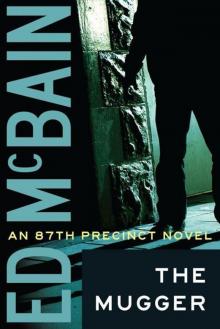 87th Precinct 02 - The Mugger
87th Precinct 02 - The Mugger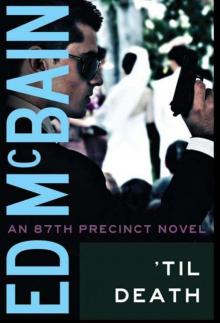 87th Precinct 09 - Til Death
87th Precinct 09 - Til Death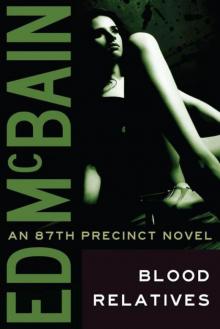 Blood Relatives (87th Precinct)
Blood Relatives (87th Precinct) Killer's Payoff
Killer's Payoff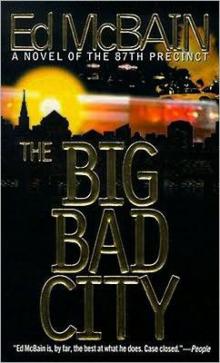 The Big Bad City
The Big Bad City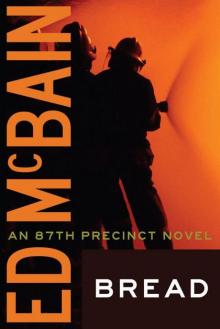 Bread (87th Precinct)
Bread (87th Precinct)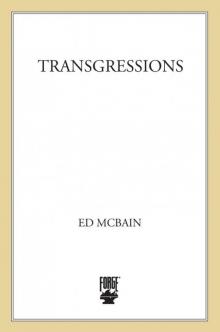 Transgressions Vol. 3
Transgressions Vol. 3 Runaway
Runaway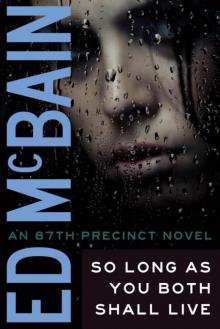 So Long As You Both Shall Live (87th Precinct)
So Long As You Both Shall Live (87th Precinct)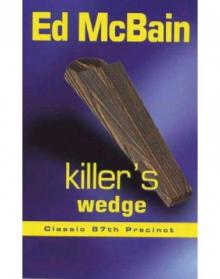 Killer's Wedge
Killer's Wedge